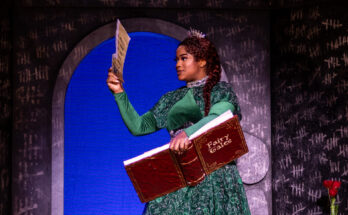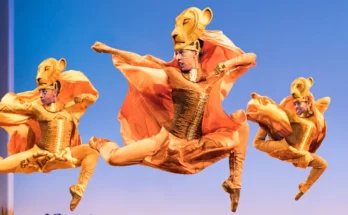Ten years ago, Gregory Maguire published Wicked: The Life and Times of the Wicked Witch of the West, a novel that reconfigured pop culture’s perception of one of the most widely despised characters of American literature and cinema. By retelling The Wizard of Oz from the point of view of Elphaba — a smart, passionate girl who grows up to become the infamous and widely feared witch — Maguire allows readers to take a more complex look at the nature of truth, the value of beauty and the cost of moral behavior.
“I wanted to examine the nature of evil,” Maguire says. “I wanted to investigate it so I could understand it.”
The idea took root in Maguire’s imagination after two events he witnessed in London 12 years ago, at the start of the first Gulf War. One morning, Maguire picked up a normally conservative paper running a headline comparing Sadaam Hussein to Hitler.
“I had a very strong emotional reaction to that,” Maguire says. “Based on that word, Hitler, I was prepared to read the story in a certain way. And I watched how scared everyone became when you called someone evil. How that makes that person worthy of all sorts of attacks.”
The second incident involved two schoolboys who casually abducted a two-year-old from a shopping mall and murdered him. “There was a lot of discussion from the pulpit and in the papers, a lot of chatter about how these boys could have done that, what might have caused behavior like that, and if they could be called evil.”
Maguire, who had previously only written books for children, began looking for the vehicle he could use to explore the questions being raised. When he thought of the Wicked Witch of the West, he knew he had found his story.
“Aside from Hitler, [she] is the scariest person to my generation,” Maguire says. “And the more I thought about it, the more I thought how perfect she was because everyone knows her, but no one knows anything about her. I mean we know she’s a lean, green, flying machine, but we don’t know her history.”
Maguire had the germ of an intriguing idea. He had the perfect vehicle. But he doubted his ability to do it justice. “Most children’s books are in a sense like sitcoms. But writing about a life, it’s like a Dickens novel. I wasn’t sure I could do it. I wanted to be Tolkien to Oz — to write a deep, rich, complex and compelling history.” The thought that someone else might have the same great idea eventually spurred Maguire to sit down and write Wicked in spite of himself.
The history of Elphaba, her friendship with the “good” witch, her love affairs, the politics of Oz, and why she wanted those ruby slippers so bad are all told in Wicked, which became a best-seller. Universal Studios bought the movie rights a week after its publication.
“The story was appealing from the beginning,” Maguire says. “I would tell friends that I was writing a book that would tell Wizard of Oz from the witch’s point of view and they were very interested.
“It’s an American story too,” he continues. “We in the States particularly pay lip service and genuinely believe in the rights of the individual, however disenfranchised they may be in society. Who is less integrated in a society that prizes integration than a green-skinned witch? And that’s what she thirsts after. What she wants more than anything else is to be a member of the community. Her massive difference is really only skin deep, but nonetheless, she is pilloried for it. And that’s American, too, because we, unfortunately, have a serious and regrettable history of racism that is not completed yet.”
The book may have remained on the shelf had veteran Broadway composer and lyricist Stephen Schwartz (Godspell, Working) not chosen to read Wicked on holiday. “He told me about 100 pages in he realized that it was going to be his comeback vehicle,” Maguire says.
The fact that Universal held the rights did not deter Schwartz. “He said, ‘I’ll wait until Universal realizes they can’t do it. They don’t want to put $100 million into a movie because it would make a better play,’” Maguire remembers. “And I really think he persuaded them they didn’t want to make a movie of it. Mark Platt at Universal steered it towards the stage, and Universal became one of the primary underwriters of the musical.”
Maguire did not involve himself in the adaptation process. He left that to Schwartz and Winnie Holzman (“My So-Called Life,” “thirtysomething”), who wrote the book. “It made more sense to me to let the professionals do their jobs without my input. … I thought it was the only way to proceed without being too nervous.”
Opening night of Wicked on Broadway, Maguire was nervous anyway. “I was sitting in the middle of row five and I sat down and thought, ‘This is going to be dreadful. If they hate it and start throwing things at the stage, there’s no way to escape.’”
He relaxed a little bit when Kristin Chenoweth, as Galinda, got a laugh with her first line, but it wasn’t until Elphaba’s entrance that he knew everything was going to be fine.
“Idina Menzel rushed out on to the stage and the audience roared their greeting to her. She hadn’t opened her mouth. She hadn’t sung a note in that exquisite voice, but the audience was on its feet. They were on her side before the play even began because of my book. I felt like I had been bioengineering and tweaked one tiny chromosome on a string of DNA in our popular culture,” Maguire says.
The musical has a solid fan base of young women and girls, something Maguire credits Holzman with achieving. “She has slanted it … taken something that’s huge and complex and heavy with cynicism and grief and rewoven it into a lighter area fabric,” Maguire says.
“My book is not for 11-year-old or 14-year-old girls. It’s a very dark story. There’s sex. There’s violence. Winnie retold it in a way that concentrates on the consolations: That even the green-skinned witch can get the guy. That friendship — even though it goes through rocky patches — can still survive. Both things are in the book, but Winnie made it the centerpiece of the story and play, and deservedly so.”
Wicked went on to win several Tony, Outer Critics Circle, Drama League, Grammy and Drama Desk awards. It set a new box-office record for weekly ticket sales ($1.1 million) at the Gershwin Theater in its third week. Currently, Wicked is on its first national tour, and there are five international touring companies forming.
Fans of the musical often go on to read Maguire’s novel. “And these women and girls have begun to write me such strong, definitive letters with questions about what happens at the end of my novel: ‘Now tell me what happened to the political prisoner? What happened after Dorothy went back to the Emerald City?’” As a response to these questions — and as homage to his favorite character — Maguire revisited the Land of Oz and published Son of a Witch last fall.
“But, truth in advertising, it is the story of someone else,” Maguire says. “Characters from Wicked do show up in cameos, but it’s the story of a different time, under a different administration. And it’s not a friendly one.”
::
This article originally ran in the May 2006 issue of Encore Atlanta.



